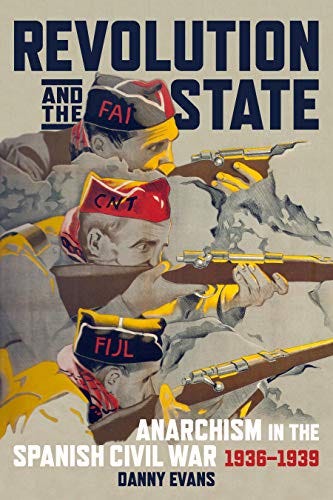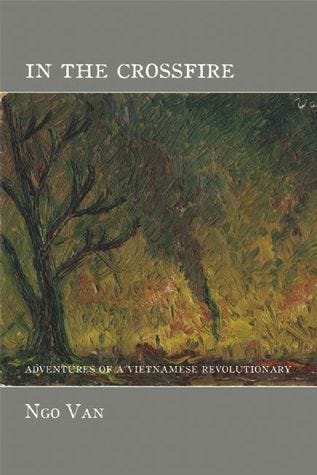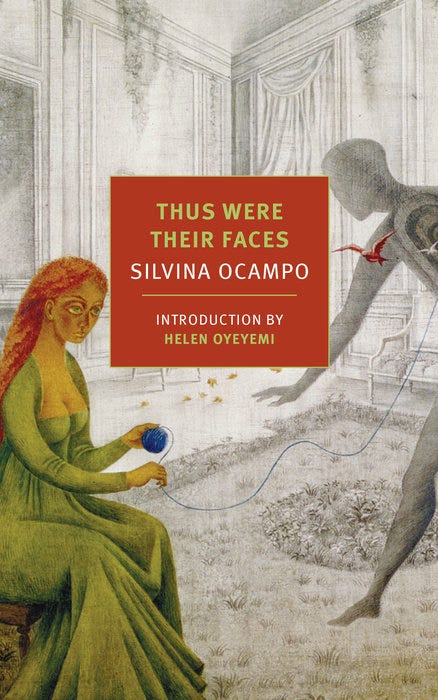Hello everyone, and welcome to another issue of Words for Worlds - the 100th issue, it turns out. Not bad, eh? Here’s to many hundred more!
A reminder that voting for The Ignyte Awards is still open, and THE SENTENCE is a finalist in the best novel category. You can vote here, if you’re so inclined, and get a copy of the novel here.
What I’m Reading
I recently read two books from - and about - different ends of the earth, but which turned out to have connections in the most unforeseen of ways. The first of these was Danny Evans’ Anarchism and the Spanish Civil War, 1936-1939. I’ve had this book on my shelves for many years, and what finally made me pull it down, dust it off, and get to reading it was a brilliant anarchist walking tour of Barcelona that I went on earlier this July, when I was in the city. Revolution and the State is a book about the Spanish Civil War, but from a very specific perspective: it covers the debates, disputes, dissensions, direct actions, and schisms within the anarchist movement, on the question of whether - and to what extent - the anarchists ought to have joined the republican government, as part of a broad, popular front fighting against Franco’s fascist coup attempt.
This debate split the anarchist movement into two, as one side - primarily consisting of the leaders of unions such as the CNT - argued for the necessity of a united front against Franco, even if it means participating in a project of “state reconstruction.” In a way, these anarchists argued for a division of the economic and the political spheres, where the economic could be confronted after the political (and military) victory over Franco. On the other hand, for many rank and file anarchists (especially in Barcelona), the revolution (which sought to dismantle the capitalist State) was indistinguishable from the anti-fascist fight; these anarchists warned that even if Franco was militarily defeated, a reconstructed republican State would amount to little other than a new set of oppressors replacing the previous set.
Evans skilfully takes us through these debates without ever getting bogged down in theoretical minutae, interspersing them with the actual action (primarily in Barcelona) which, for a time, saw something close to the realisation of the anarchist dream, where all manners of hierarchies (including gender hierarchies) were temporarily broken down (these are some of the book’s most inspiring sections). In the event, as we know, this would all end in tragedy, as Franco’s army would prevail, and over much bloodshed, Spain would suffer a fascist dictatorship for the next four decades; one would think that this would make the internal debates within the anarchists moot, but one of the signal achievements of this book is how it shows us that in every conceivable way, these debates matter to the world as it exists today.
A few months ago, I read Joseph Andras’ magnificently styled Faraway the Southern Sky, which chronicles a young Ho Chi Minh’s time in Paris, in the 1920s. As in the manner of all brilliant books that are about historical subjects, Faraway the Southern Sky cast a dazzling light upon the figure of Ho Chi Minh, in his formative years as an anti-colonial revolutionary. This is of a piece, of course, with the position that the Vietnam War has come to occupy in the popular anti-colonial imagination, chronicled (for example) by Salar Mohandesi in Red Internationalism. I also recall, vividly, how in the Thawra podcast, Abdel Razzaq Takriti notes that in the Arab world, it is called Thawra-e-Vietnam (the Vietnamese Revolution), and not the “Vietnam War.”
One can understand the utility - perhaps even, to an extent - the necessity of this framing in a certain time and place, but when I described what this book was about to someone in my life, their response was that they were “glad that this book exists,” and on finishing it, I’m glad too: because In the Crossfire is the Vietnamese version of Victor Serge’s defence of Kronstadt, Voline’s underground history of the Russian Revolution, or even Orwell’s account of the Spanish Revolution. Ngo Van belonged to the “left opposition” which - much like the Spanish anarchists - found themselves caught between the colonial (French) brutality on the one side, and the Stalinist front of the anti-colonial struggle (led by the likes of Ho Chi Minh on the other). For this, he faced imprisonment, torture, near-death, and eventually, exile. In the Crossfire, then, is the story of the Vietnamese anti-colonial struggle that was erased by Stalinist victory (and subsequently, by their assumption of the anti-colonial mantle in the Vietnam War) - it is the critique of the dominant Vietnamese narrative from the left, from the perspective of the insurgent, and - although Van disavows the label - of the anarchist.
And the links with Spain are everywhere: the Vietnamese struggle was almost contemporaneous with the Spanish Revolution and Civil War, and Van affirmatively speaks about how the Vietnamese revolutionaries were inspired by their Spanish counterparts; later in the book, during his exile in France, some of his closest comrades are anarchist refugees from the Spanish Civil War, fleeing from the Franco regime. “Internationalism” is a term that is much abused these days - but in In the Crossfire, we see a living, breathing example of internationalism at its best.
What’s Happening at Strange Horizons
Thank you to everyone who contributed to the Strange Horizons fund-drive, which was successful; we raised above our baseline costs, and will be publishing for our 26th year running (2026).
Check out our 7th July issue, which focuses on criticism of translated works of SF: here you will find books by Yoko Tawada and translations by Sawad Hussain, among others.
The Indian Scene
A quick update on the Westland-IF anthology of new Indian SF: we’ve finalised the cover, and the tentative publication date is August 18. Keep an eye out on your socials for the cover reveal, and more.
Recommendations Corner
For the Delhi Science Fiction Reading Circle this July, we read Adolfo Bioy Casares’ The Invention of Morel and Héctor Germán Oesterheld’s The Eternaut. So, staying with the theme of mid-20th century Argentine SF, here is a collected volume of Silvina Ocampo’s short fiction, Thus Were Their Faces. Ocampo was part of the literary circle around Borges, and her own intricate connections with this circle (Victoria Ocampo’s sister, Borges’ protege, and Adolfo Bioy Casares’ romantic partner) meant that for a long time her own literary work tended to stay in the shadows; this is, however, now changing, and the publication of the NYRB collection is evidence of that. In this collection, you will find magical realist stories written before “magical realism” became a label in the 1960s, and forays into the fantastic that are reminiscent of Borges, but are very much their own works. For a good introduction, see Paul Kincaid’s review in Strange Horizons, here.






hi! i wanted to join the SF reading circle in delhi, how do i go about doing that?